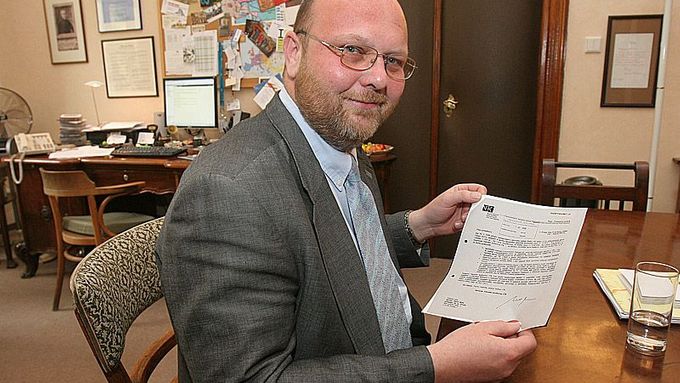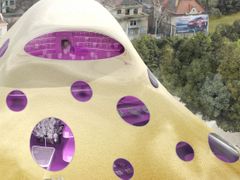
Prague - The former director of the National Library sees the Prague Mayor Pavel Bém to be one of the main culprits of the end of Kaplický's octopus project at Letná. He writes about it in his forthcoming book Střepiny chobotnice - Národ sobě [Splinters of the Octopus - The Nation to Itself], the manuscript of which is available to Aktuálně.cz.
Ježek is trying to prove through several stories that the Prague mayor betrayed, following many negotiations on the building of the library. He notes that Bém was excited about the project at the beginning. He only changed his stance after President Václav Klaus and National Gallery director Milan Knížák criticised the project.
"All the time, Pavel Bém was in a very difficult position. He had to fight pressures that were not directly connected with the library itself. In the past year, I was often mad at him; today I'm only sorry for him," Ježek writes in his book that will be published at the beginning of March by the publishing house Daranus.
Dirty trick #1: land contract
The project of the new library building at Letná flopped mainly because the library was not able to negotiate the terms of land purchase with the city of Prague.
Ježek describes in detail what complications accompanied the sale of the land for the library. Although Prague city representatives agreed with the sale and Pavel Bém himself promised the land to Ježek, Prague never eventually signed the contract.
Dirty trick #2: Kaplický? No way
Till the results of the architectonic tender were made public, Bém had always been positive about building the library at Letná. Ježek proves this by one of many quotes in his book:
"The capital city will not have a passive role in this exceptional project. Prague not only sold the necessary land to the National Library for a symbolic price (this never happened - author's note), but it also remains an important partner in the project," he said after Kaplický won the tender.
However, what followed was opposition to Kaplický's project, not only by the Prague branch of the ODS, but also by President Václav Klaus. In October 2007 Bém changed his mind about Kaplický's octopus.
"I consider Kaplický's proposal to be an immensely interesting architectonic project; however, its placement in the centre of the Prague monument reservation (PPR) (the property is one kilometre from its border - author's note) is not a good solution. We really don't need the octopus in the close vicinity of the Castle," Pavel Bém said and surprisingly added: "We have been looking for another spot for three months. We are considering Prosek, Letňany or the plateau at Pankrác."
Things started to move quickly and Bém was interested only in one thing then: to oust the project from Prague. "When I was trying to reach him on the phone, he wouldn't answer it and did not respond to my repeated text messages either. He got back to me only on the following Monday 15 October 2007 with a brief text message: "I think that we are behind the zenith," this is how Ježek described the October events that were connected with the project of the new library building.
Dirty trick #3: Bém and the National Library Team
Ježek describes in the book how he and the Prague mayor agreed on some things despite all the clashes. This involved the creation of the National Library Team which was to evaluate all objections against Kaplický's project. It consisted of a team of preservationists, architects, and lawyers.
At the first joint meeting, lawyers declared that the project can continue, although they clearly specified all the possible risks.
"At that time Bém and his people were probably determined to resume their negative stance to the construction. Their tactic consisted in prolonging the works of the team as much as possible - what will not eventually fade out in the public…Especially Karel Muzikář from the committee of lawyers then became his Trojan horse. He was then giving distorted information (he was presenting his ideas to be the committee's conclusions) on the committee's work to the media (especially to Mladá fronta Dnes), although the lawyers agreed that they would not communicate with journalists," Ježek says, describing Bém's intervention in the library project.
The team eventually ended its operation, but the Ministry of Culture asked for a re-examination of the tender by the antimonopoly office, which delayed the preparation for the construction of the library even more.
Ježek also sees this as the mayor's betrayal. The antimonopoly office was addressed by František Mikeš, the first Deputy Minister of Culture, whom Ježek describes as "an executor of Bém's arbitrariness, who was willing to do anything".
Adapted and republished by Prague Daily Monitor.

